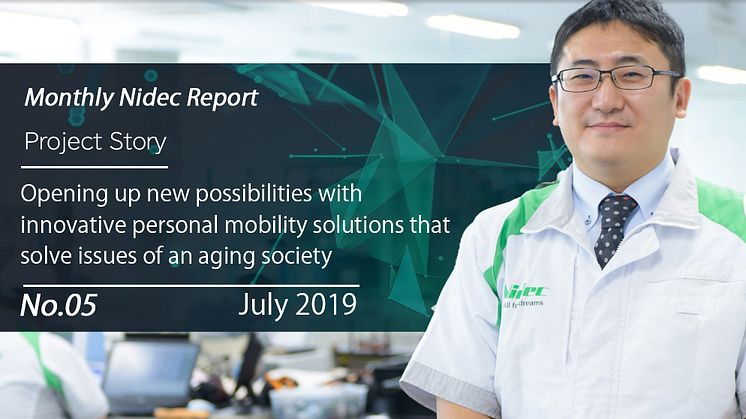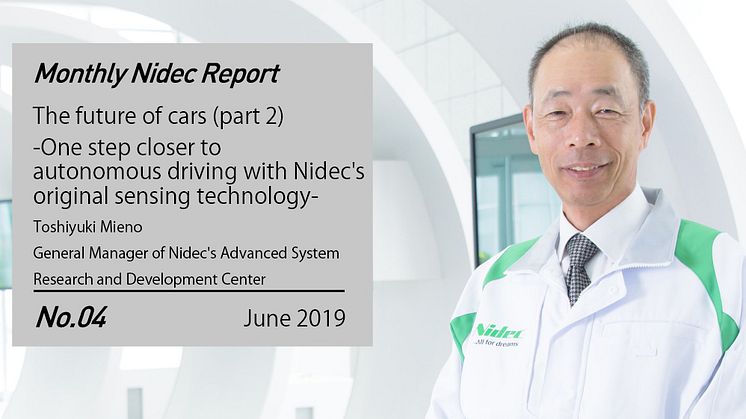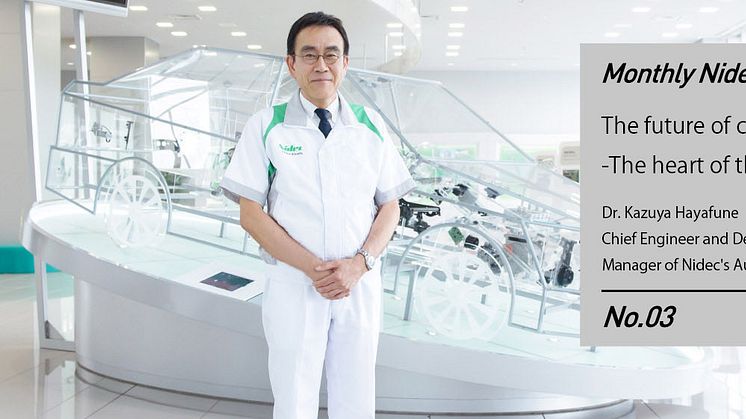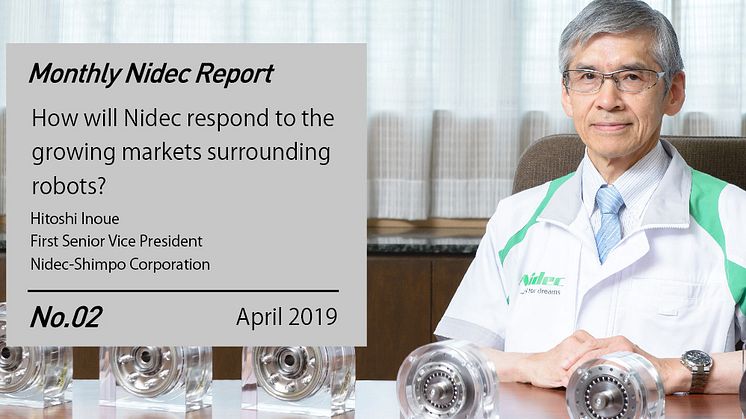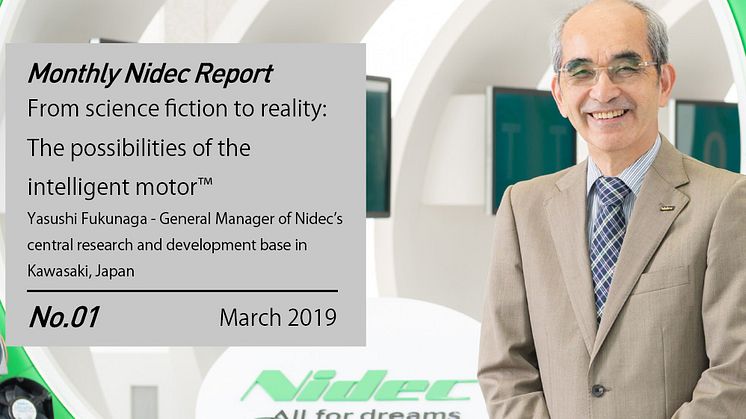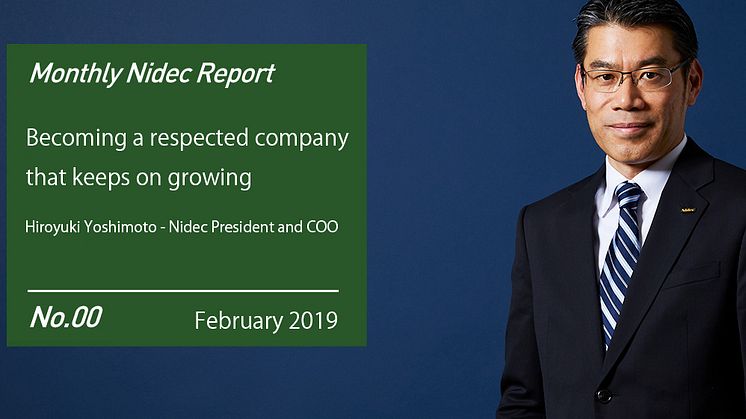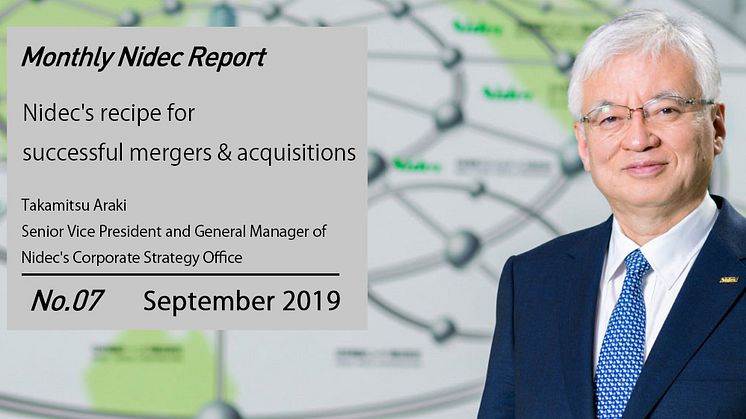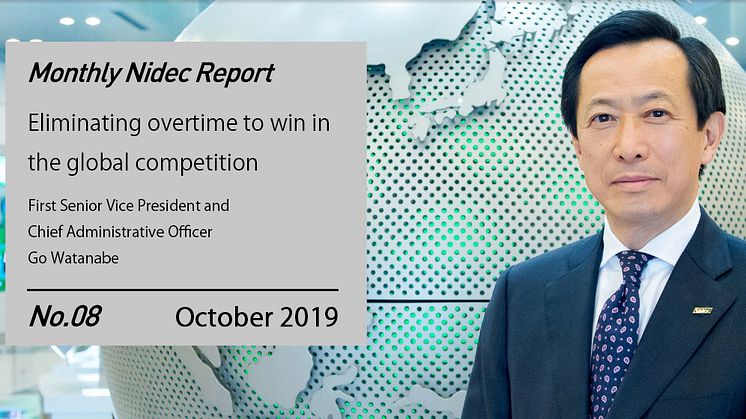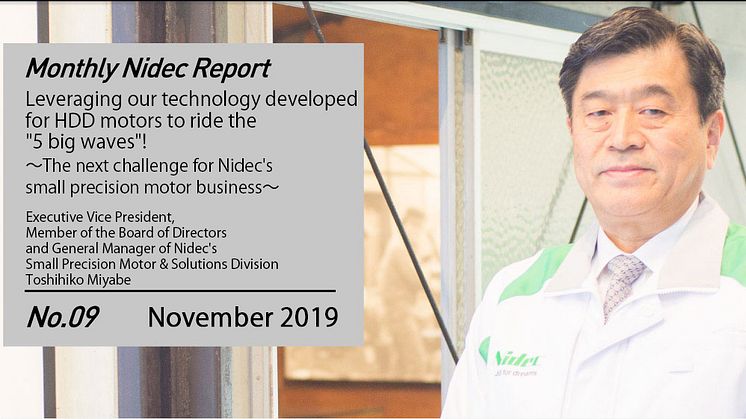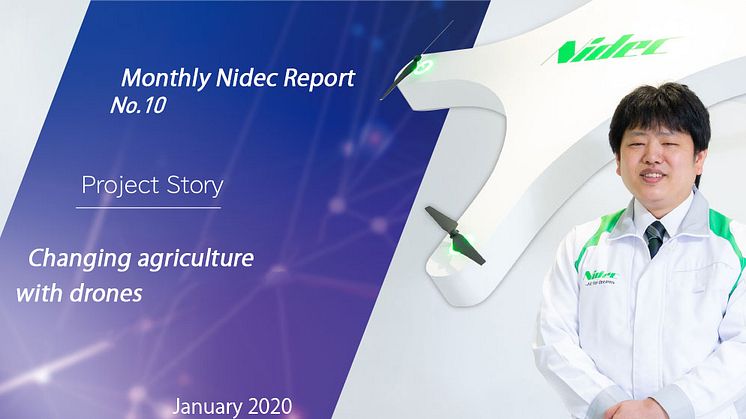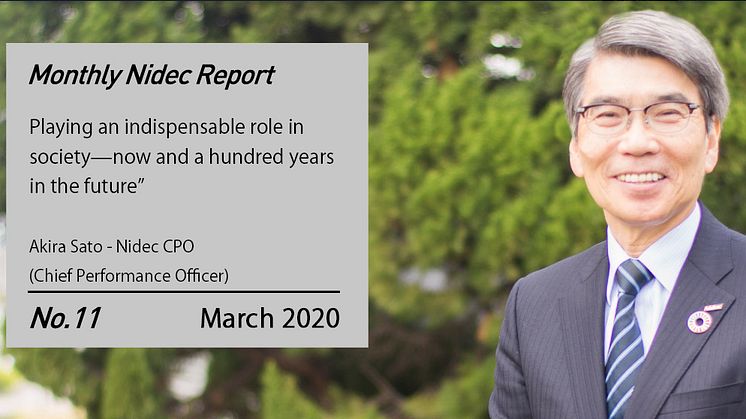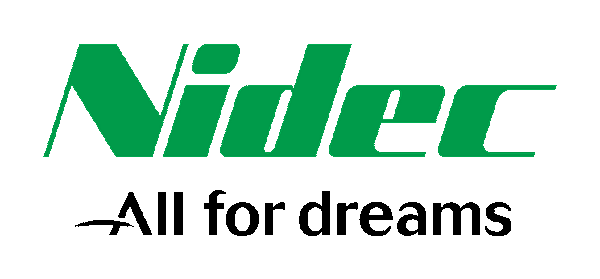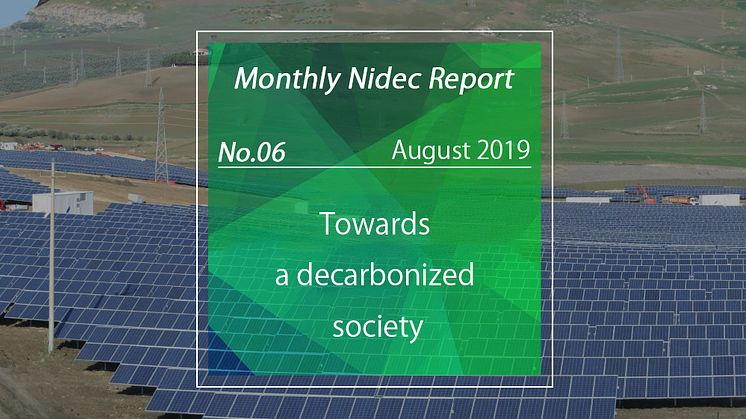
Blog post -
Monthly Nidec Report - Towards a decarbonized society
The market for renewable energy solutions is expanding around the world as global warming progresses and fossil fuels dry up. Nidec's contribution to sustainability has traditionally been in the shape of efficient motors that reduce energy consumption, but for some time we have been stepping up our efforts to contribute through energy creation as well. Nidec ASI that became a part of the Nidec group in 2012 plays a central role in this area. In this installment, we take a look at Nidec ASI's strategy as told by Franck Girard, the Chairman & Managing Director of Nidec ASI - France.

The transition from conventional thermal power generation to renewable-energy-based generation is picking up pace around the world. With growing concerns about global warming and exhaustion of fossil fuel resources looming on the horizon, renewable energy options like solar power, wind power and biomass are seeing more and more use in countries all over the world.
European countries at the forefront of renewable energy are making large-scale investments focused on photovoltaic and wind power generation with a renewable energy target of "32% by 2030." At the same time, Asian countries have recently turned to renewable energy as a solution to the explosion in power demand due to economic growth.
Microgrid technology for distributed generation

An example of Nidec ASI's microgrid solutions
Renewable energy is not without issues though: solar and wind power are subject to fluctuations due to unpredictable weather and seasonal conditions. Large amounts of unstable power, if introduced to the regular grid, can impact the fine balance between supply and demand, affecting power quality. Motors and industrial machinery in factories would no longer be able to operate stably and product quality would drop. Appliances in people's homes would break down and cause accidents due to fluctuations in frequency. Blackouts would occur and people would no longer be able to use electricity freely without worry.
The solution? Microgrid technology. Microgrids are on-site power systems that are networks of solar, wind or other power generation combined with a battery energy storage system (BESS).These networks, which can operate independently of the regular power grid, are capable of offsetting fluctuations caused by weather conditions as the BESS acts as a buffer, charging and discharging as necessary. As a result, power quality can be upheld, even when microgrids are connected to the regular power grid.
Nidec ASI has seen rapid growth in their microgrid-focused business. "Our deep expertise in power quality management lets us control the energy flowing to the grid in real time. Due to this, we can safeguard the grid from power outages.”

Franck Girard, Chairman & Managing Director of Nidec ASI - France
A history of providing solutions for 165 years
Nidec ASI is a long-standing company headquartered in Milan, Italy. Tracing its roots back to 1853, the company has been in business for over 165 years. After initially focusing on the manufacture of industrial machinery, the company expanded into other areas like electrical systems for railway vehicles and ships, and went on to refine their technology in the field of power generation and distribution. With over 20 years of experience in this area, Nidec ASI is no stranger to renewable energy. In 2005, the company started offering photovoltaic inverters, and to date it has delivered inverter-based power supply modules to over 120 photovoltaic plants. Nidec ASI also takes on projects that involve constructing the power plants from scratch and provides full-package solutions—motors, generators and inverters—for off-shore wind power and hydroelectric power as well.
After starting development of software for microgrids in 2009, the company went on to construct its first microgrid in Chile in 2014. This undertaking was followed by similar projects in Europe and Africa etc.
"Nidec ASI's strength lies in our wealth of experience in the field of industrial power systems and power-quality management," says Franck. "Our microgrid solutions make use of our proprietary inverter technology that has a long track record of heavy-industry use. The power management systems that we use have been developed by us as well.The batteries are sourced from major manufacturers. All components of the systems are combined and supplied as full-package solutions."

Nidec ASI's Italian headquarters
 Located in the Andes in Chile, Ollagüe has an elevation of roughly 3,700 m—about the same as Japan’s Mt. Fuji. Due to its remote location, the village is not connected to the power grid and, as such, its inhabitants have long been troubled by power shortages. In order to solve this problem, Nidec ASI was tasked with installing solar and wind power generators, a large-scale energy storage system that would eliminate the problem of unstable supply and diesel generators as an additional measure to guarantee stability. By leveraging its experience and expertise accumulated through various power-grid-system projects around the world centered on renewable energy, Nidec ASI's engineers started by calculating how much power the village and its inhabitants would need at any given hour of the day or night. By combining this information with data on how many hours of daylight Ollagüe receives during a year and wind data, they then went on to design and develop an optimized cost-efficient power generation system. Now that the system has been installed, the village inhabitants can read books at night and use TVs, refrigerators and other appliances.  |

A world leader in BESS (Battery Energy Storage Systems) with over 500 MW in operation

The battery energy storage system supplied to Germany's Steag
Nidec ASI's renewable energy business has grown to encompass 10% of the company's activities in terms of sales figures. The BESS (Battery Energy Storage System) business in particular, which Nidec ASI entered in 2014, is quickly becoming a pillar in the company's growth strategy.
A BESS is a system for temporarily storing excess power from the grid so that it can be used at a later time when necessary. One of the benefits of such a system is that it can bring stability to renewable-energy power which is otherwise prone to fluctuations due to weather conditions and other factors. At the same time, it can also help maintain the desired power quality. As a result, these systems are seeing more and more use.
According to a study done by Bloomberg New Energy Finance, Nidec ASI is currently number one in the battery energy storage system field with a combined total of more than 500 MW in operation—enough to cover the energy needs of around 10,000 homes.
The majority of the BESS projects that Nidec ASI has worked on up until now have been medium-and-large-scale projects for major electric power companies and independent power generation companies in European companies. In November 2016, Nidec ASI received attention for supplying one of the largest BESS in the world at 90 MW to the German power company Steag.
In the UK, two BESS supplied to UK's National Grid*, at 10 MW and 49 MW, recently started operating in September 2017 and February 2018 respectively.With these two projects, Nidec ASI sits at a 33% share of the UK power storage system market.
"The two plants in the UK are the first battery energy storage systems to be connected to National Grid's power grid. The communication interface was configured through close collaboration with the operator of the grid and it has become the new standard in the UK. In other words, everything that is connected to the UK's power grid uses the interface developed by us," Franck Girard explains.
*National Grid is an electricity & gas provider that serves England, Wales and Northeast U.S.A. After its foundation, the company conducted business in England and Wales under the state-operated power supplier Central Electricity Generating Board (CEGB) until the 1990s when it eventually succeeded the CEGB.

One of the battery energy storage systems supplied to the UK's National Grid
Contributing to the economic development of remote areas with small-scale projects

The microgrid system installed in Chile
In addition to large-scale projects, Nidec ASI continues to be take on smaller projects like the design and construction of small-scale energy networks. A representative example of such a project is the previously mentioned microgrid project in Chile. Although, in the short term, small-scale projects may not be very profitable, Nidec ASI continues to accept them, and with good reason. "With the introduction of battery energy storage systems, rural areas all around the world get access to power from renewable energy sources and become less dependent on diesel fuel. This has benefits not only in terms of economic growth and standard of living, but it also contributes to environmental conservation efforts. Some predict that the power grid will evolve into an interconnected network of microgrids based on small-scale wind- and solar power generation etc. I believe that BESS fulfills an important role as the core of this process."
Of course, Nidec ASI also hopes that the microgrid business will contribute to long-term growth of the company. "As Europe is seeing a shift from a manufacturing-based economy to a service-based one, electricity is becoming an increasingly large part of overhead costs. Nidec ASI's BESS business helps our customers reduce their energy consumption. As such, it contributes to realizing sustainable growth both for them and for us."

Business expansion in growing markets through the synergy of the Nidec group
Nidec ASI became part of the Nidec group in 2012."The first couple of years were spent on getting to know each other. As a result we are now seeing synergy in a variety of different aspects of our business," Franck says. "The sales teams cooperate closely to generate new business opportunities. Purchasing managers work together to source from Best Cost Countries. Our respective communication departments work together as well to communicate in a unified way representing the entire Nidec group. And, of course, the management teams cooperate closely to realize our combined potential by pooling and optimizing resources like factories in order to strengthen our global presence. "With the increasing penetration of renewable energy resources, the global BESS market is growing at a pace of 10 to 15% per year. Franck Girard predicts that this strong growth will continue for 10 years or so. "I believe that as battery prices fall and new players enter the field, the market will gain even more traction and become even larger. Europe in particular is moving away from nuclear energy and towards renewable energy, so I think the prospects of our BESS business are looking good." The demand for microgrid solutions is sure to receive another boost from developing countries and rural areas. "Our mission is to continue offering solutions to people living in areas with unstable energy supply, while also contributing to decarbonization and the stabilization of power grids around the world and with our high-quality cutting-edge BESS technology based on our experience as the market leader in this field,” Franck says with his eyes set on the future.
  The ICEF (Innovation for Cool Earth Forum) is an international conference that brings together academics, industrialists and politicians in order to address the problems linked to climate change through discussion and cooperation. Organized by the Japanese government, the event has been held annually in Tokyo since 2014. Approximately 1000 participants from 80 countries and regions in the world attend the conference.Franck Girard of Nidec ASI - France represented the Nidec group at the fifth edition of the conference, held between October 10 and 11 2018. Franck took to the podium during the session focusing on renewable energy microgrids and energy access, and presented the Nidec group's efforts in this field including microgrid solutions installed by Nidec ASI in Chile and Africa. The ICEF (Innovation for Cool Earth Forum) is an international conference that brings together academics, industrialists and politicians in order to address the problems linked to climate change through discussion and cooperation. Organized by the Japanese government, the event has been held annually in Tokyo since 2014. Approximately 1000 participants from 80 countries and regions in the world attend the conference.Franck Girard of Nidec ASI - France represented the Nidec group at the fifth edition of the conference, held between October 10 and 11 2018. Franck took to the podium during the session focusing on renewable energy microgrids and energy access, and presented the Nidec group's efforts in this field including microgrid solutions installed by Nidec ASI in Chile and Africa. |
